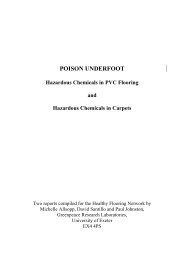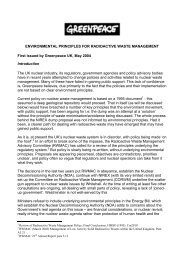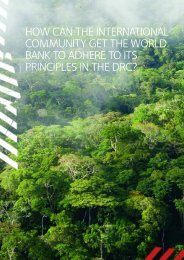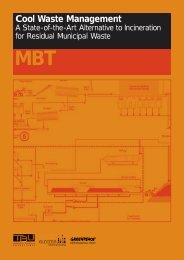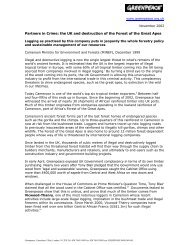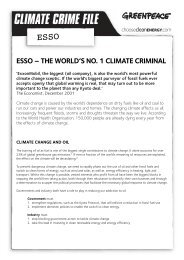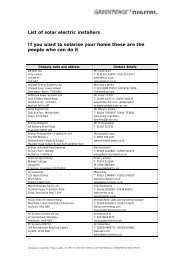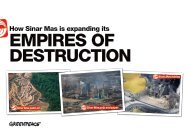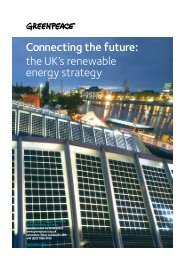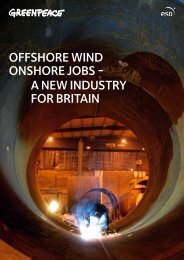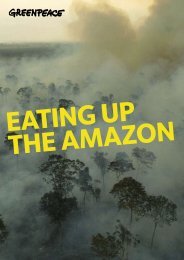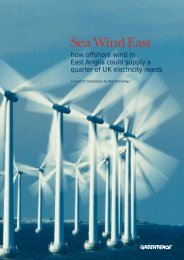bp and shell: rising risks in tar sands investments - Oil Change ...
bp and shell: rising risks in tar sands investments - Oil Change ...
bp and shell: rising risks in tar sands investments - Oil Change ...
Create successful ePaper yourself
Turn your PDF publications into a flip-book with our unique Google optimized e-Paper software.
HEROIC PROSPECTS<br />
OR DESPERATE<br />
MEASURES?<br />
IN DECEMBER 2007, LEW WATTS, PRESIDENT OF GLOBAL ENERGY CONSULTANCY PFC ENERGY, SPOKE OF THE<br />
CURRENT INTEREST IN TAR SANDS AS ‘EVIDENCE OF ANOTHER NAIL IN THE CLOSING COFFIN FOR THE<br />
INTERNATIONAL OIL COMPANIES… FOR RESERVES OF THIS SIZE, THEY’VE REALLY GOT NOWHERE ELSE TO GO…<br />
THAT IS WHY THEY ARE WILLING TO TAKE ON THE ECONOMIC AND ENVIRONMENTAL RISKS’. 9<br />
WHAT ARE THE CONDITIONS THAT ARE DRIVING<br />
THESE RISKS?<br />
In 1979, the major <strong>in</strong>ternational oil companies (IOCs) controlled<br />
around 70% of global oil reserves. Thirty years later that figure has<br />
dropped below 10%. 10 This is largely due to the decl<strong>in</strong>e of resources <strong>in</strong><br />
areas where the IOCs had significant reserves <strong>and</strong> <strong>in</strong>creas<strong>in</strong>gly<br />
restricted access to new reserves due to <strong>in</strong>creas<strong>in</strong>g control over<br />
resources by states such as Venezuela <strong>and</strong> Russia.<br />
For example, for over a year BP has faced an <strong>in</strong>creas<strong>in</strong>gly challeng<strong>in</strong>g<br />
threat to its 50% stake <strong>in</strong> Russia’s third biggest oil producer TNK-BP,<br />
which <strong>in</strong> turn threatens the company as a whole. For TNK-BP<br />
represents about 25% of BP’s global production <strong>and</strong> around a fifth of<br />
its reserves. 11 This level of dependence on a s<strong>in</strong>gle <strong>in</strong>vestment based<br />
<strong>in</strong> a politically unreliable country expla<strong>in</strong>s much about BP’s late but<br />
significant move <strong>in</strong>to Alberta’s <strong>tar</strong> s<strong>and</strong>s.<br />
S<strong>in</strong>ce Shell’s reserves report<strong>in</strong>g debacle of 2004, the company has<br />
worked hard to f<strong>in</strong>d new assets. There was serious concern that the<br />
company’s partial ejection from the Sakhal<strong>in</strong> II project, after a long<br />
battle with the Kreml<strong>in</strong>, would hamper this search to replace reserves.<br />
However <strong>in</strong> March 2008 Shell reported its reserves replacement ratio<br />
as 124%, with analysts observ<strong>in</strong>g that the loss <strong>in</strong> Russia had been<br />
offset <strong>in</strong> Canada – by a costly acquisition. 12 In 2007, <strong>in</strong> a move<br />
personally guided by CEO Jeroen van der Veer, Royal Dutch Shell took<br />
full control of Shell Canada via a share purchase <strong>in</strong> which the parent<br />
company paid above the market rate. 13 This mirrored an earlier<br />
purchase. In 2006 Shell raised eyebrows <strong>in</strong> the <strong>in</strong>dustry by offer<strong>in</strong>g<br />
C$2.4bn for Black Rock Ventures, which was exp<strong>and</strong><strong>in</strong>g production <strong>in</strong><br />
the Peace River <strong>tar</strong> s<strong>and</strong>s area. Shell’s price amounted to about C$4 a<br />
barrel of reserves, compared with the C$1.25 that Total paid <strong>in</strong> 2005<br />
when it acquired Deer Creek Energy. 14 Canadian <strong>tar</strong> s<strong>and</strong>s now<br />
constitute nearly one third of Shell’s proved reserves. 15<br />
It is often repeated <strong>in</strong> the media that the Canadian <strong>tar</strong> s<strong>and</strong>s<br />
constitute a glitter<strong>in</strong>g prize. They are estimated by some to conta<strong>in</strong><br />
173–179 billion barrels of recoverable oil, a resource second only to<br />
Saudi Arabia <strong>and</strong> represent<strong>in</strong>g 12% of global reserves. 16 However<br />
access<strong>in</strong>g this ‘unconventional oil’ represents a significant shift for<br />
both BP <strong>and</strong> Shell. Both have tried to present the shift as an <strong>in</strong>evitable<br />
progression.<br />
Around the active promotion <strong>in</strong> the f<strong>in</strong>ance sector of ‘Shell Energy<br />
Scenarios to 2050’ <strong>in</strong> February 2008, senior executives such as van<br />
der Veer <strong>and</strong> James Smith (CEO Shell UK) repeatedly talked of ‘the<br />
end of the era of easy oil’, emphasis<strong>in</strong>g <strong>tar</strong> s<strong>and</strong>s as the new frontier<br />
where a company like Shell had to go <strong>in</strong> order to avoid disappo<strong>in</strong>t<strong>in</strong>g<br />
global energy dem<strong>and</strong>. 17<br />
But this shift is neither an <strong>in</strong>evitable, nor smooth, progression.<br />
Instead, it is a consciously chosen move <strong>in</strong>to a high risk endeavour<br />
with significant global impacts.<br />
Canadian <strong>tar</strong> s<strong>and</strong>s now constitute nearly<br />
one third of Shell’s proved reserves. 15<br />
6


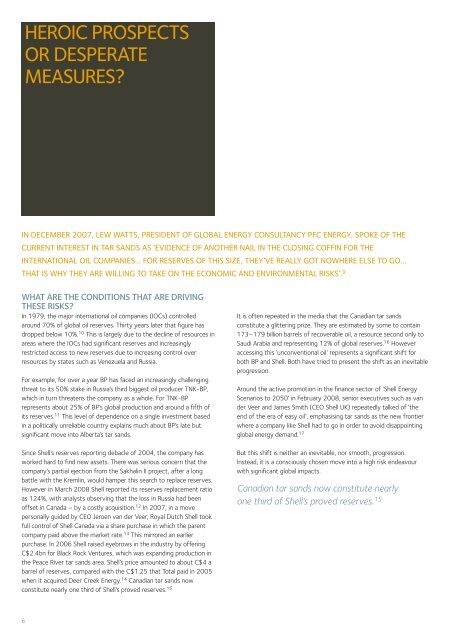
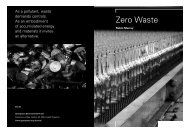
![[2007] EWHC 311 - Greenpeace UK](https://img.yumpu.com/22079793/1/184x260/2007-ewhc-311-greenpeace-uk.jpg?quality=85)
